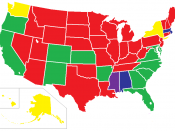The last five years have been filled with new abortion laws, but not all of them match the federal laws. Pro-life activists claim abortion is too easily available and is murder, while pro-choice activists claim there are too many restrictions and abortion is a woman's right. States are passing abortion laws that some consider illegal, while others are pushing for them to be enforced. The issue is not whether abortion is right or wrong, but whether it is legal or illegal. Some states, as well as congress, have recently passed abortion laws that are in direct conflict with the United States Constitution.
In 1973, the Supreme Court recognized that women have the right to an abortion according to the Constitution. This law, Roe v. Wade, states the following (in a non-technical language):
a) Up to the end of the first trimester, the decision and process must be left to the pregnant woman's physician.
b) After the first trimester, states may regulate the abortion procedure unless the mother's health is in jeopardy.
c) After the seventh month, state may regulate or ban abortion, except if medical judgment deems it necessary for the preservation of the life or health of the mother.
If the new abortion restrictions do not conflict with the Constitution, then they need to be enforced or the Constitution needs to be amended. If they do conflict with the Constitution, then they need to be rewritten. Although pro-life activists would love to see Roe v. Wade revoked, losing a Constitutional right could cause more conflicts within our nation than legalized abortion ever has. State laws should not be allowed to go against the Constitution.
South Dakota's new abortion law goes against the Constitution. This law should not be allowed to go into effect. South Dakota recently passed an abortion...


